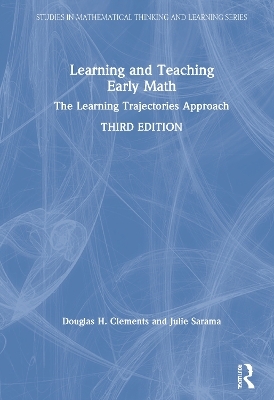
Learning and Teaching Early Math
Routledge (Verlag)
978-0-367-53855-2 (ISBN)
The third edition of this significant and groundbreaking book summarizes current research into how young children learn mathematics and how best to develop foundational knowledge to realize more effective teaching.
Using straightforward, practical language, early math experts Douglas Clements and Julie Sarama show how learning trajectories help teachers understand children’s level of mathematical understanding and lead to better teaching. By focusing on the inherent delight and curiosity behind young children’s mathematical reasoning, learning trajectories ultimately make teaching more joyous: helping teachers understand the varying levels of knowledge exhibited by individual students, it allows them to better meet the learning needs of all children.
This thoroughly revised and contemporary third edition of Learning and Teaching Early Math remains the definitive, research-based resource to help teachers understand the learning trajectories of early mathematics and become confident, credible professionals. The new edition draws on numerous new research studies, offers expanded international examples, and includes updated illustrations throughout.
This new edition is closely linked with Learning and Teaching with Learning Trajectories–[LT]²–an open-access, web-based tool for early childhood educators to learn about how children think and learn about mathematics. Head to LearningTrajectories.org for ongoing updates, interactive games, and practical tools that support classroom learning.
Douglas H. Clements is Distinguished University Professor, the Kennedy Endowed Chair in Early Childhood Learning, and co-Executive Director of the Marsico Institute of Early Learning, at the University of Denver. Julie Sarama is Distinguished University Professor, the Kennedy Endowed Chair in Innovative Learning Technologies, and co-Executive Director of the Marsico Institute of Early Learning, at the University of Denver.
1. Young Children and Mathematics Learning
2. Quantity, Number, and Subitizing
3. Verbal and Object Counting
4. Comparing, Ordering, and Estimating
5. Arithmetic: Early Addition and Subtraction and Counting Strategies
6. Arithmetic: Composition of Number, Place Value, and Multidigit Addition
and Subtraction, and Multiplication and Division, and Fractions
7. Spatial Thinking
8. Shape
9. Composition and Decomposition of Shapes
10. Geometric Measurement: Length
11. Geometric Measurement: Area, Volume, and Angle
12. Other Content Domains: Patterns, Structure, and Algebraic Thinking; Classification and Data
13. Mathematical Processes and Practices
14. Cognition, Affect, and Equity
15. Early Childhood Mathematics Education: Contexts and Curricula
16. Instructional Practices and Pedagogical Issues
| Erscheinungsdatum | 16.01.2021 |
|---|---|
| Reihe/Serie | Studies in Mathematical Thinking and Learning Series |
| Zusatzinfo | 33 Tables, black and white; 164 Line drawings, black and white; 109 Halftones, black and white; 273 Illustrations, black and white |
| Verlagsort | London |
| Sprache | englisch |
| Maße | 178 x 254 mm |
| Gewicht | 997 g |
| Themenwelt | Sozialwissenschaften ► Pädagogik ► Schulpädagogik / Grundschule |
| Sozialwissenschaften ► Pädagogik ► Vorschulpädagogik | |
| ISBN-10 | 0-367-53855-5 / 0367538555 |
| ISBN-13 | 978-0-367-53855-2 / 9780367538552 |
| Zustand | Neuware |
| Informationen gemäß Produktsicherheitsverordnung (GPSR) | |
| Haben Sie eine Frage zum Produkt? |
aus dem Bereich


